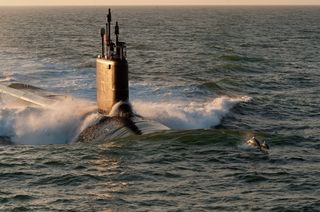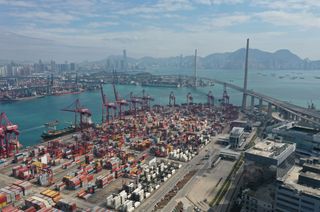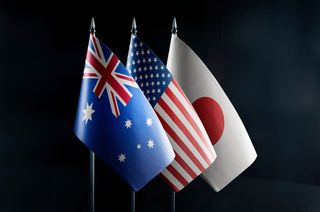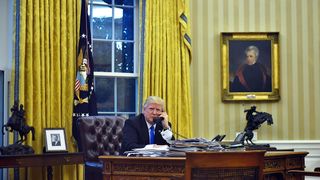Perhaps especially for democracies, politics between nations is as much about politics within those nations. US President Donald Trump was elected on an "America First" platform, advocating a radically tough stance on immigration – linking immigration explicitly to security – and, in his first week in office, issuing executive orders to suspend arrivals from a number of majority Muslim countries.
For all the outrage and protest in the United States over Trump's policies, it is not clear yet that anything Trump has said or done has cost him any of the 45.9 per cent of the vote he won in November.
Set against the domestic US political context, the notion that the refugee resettlement deal was not dead-on-arrival in the Trump administration speaks volumes about Australia's relationship with the United States. Trump reportedly fumed at Turnbull.
Trump has fired away on Twitter about the deal being dumb. But Trump said he would "study" the deal. Set against the context of Trump's campaign and his executive orders, this is a remarkable concession, a testament to Australia's standing in Washington.
The deal may yet die. But the very fact that it survived first contact with the Trump administration is worth keeping in mind. The fact section 5 of Trump's executive order restricting immigration gave him legal room to pursue the deal suggests some pro-Australian engineering behind the scenes (a hat tip to Joe Hockey and Co in our Washington embassy is in order).
Australians should also take some reassurance from the way that much of the American commentary has rallied around Australia in the last 36 hours, much of it motivated by a broad disapproval of Trump, but genuinely horrified that the United States might be damaging its relationship with an ally as valuable and as loyal as Australia.
Whatever the outcome of the deal, the value and depth of Australia's relationship with the United States has had the best media cycle in the US I can recall in my lifetime of studying politics in both countries. Senator John McCain's elegant press release – emphasising the long history of shared sacrifice between the two countries – is an extremely helpful intervention.
Last week in Los Angeles – as a part of G'Day USA – the United States Studies Centre convened a round table that drew on the expertise of two former Australian ambassadors to the United States and three former American ambassadors to Australia, along with experienced foreign policy practitioners and business leaders from both countries.
Again I was reminded of how deep the relationship between Australia and the United States runs, not just in defence and intelligence, but in trade and investment, science, medicine, entertainment and culture. As Kim Beazley is fond of reminding us, there is simply too much invested and hardwired into the Australian-American relationship for any one political leader to dismantle, at least not easily or quickly.
But there can be no sugar-coating that fact that the Trump-Turnbull call was bad; the fact that it leaked is not a good thing either (to say nothing of who leaked and why). The US-Australia relationship can survive this too, but with higher "transaction costs" for Australian political leaders and, presumably, a diminished enthusiasm for working with the United States.
American defence, diplomatic and business leaders understand what is at stake in the Australia-US relationship. They are aware of the popularity of the nostrum that "Australia must choose between the United States and China", of China's cultivation of soft power and political influence in Australia. They understand that the unpopularity of Trump and his policies might tempt Australian politicians to turn the US relationship into a wedge issue.
There is hope that Americans with this depth of understanding will be soon be managing the US-Australia relationship. To this end, Julie Bishop and US Vice-President Mike Pence have made a number of productive calls. Defence Secretary James Mattis understands the depth and value of the US-Australia relationship. Indications about the teams being built at the Departments of State and Defence that will interact with Australia are very promising. Where policy-making power ultimately vests remains an open question.
Many at the Los Angeles gathering stressed that Australia needs to be realistic, to not chase fantasies about what we might wish from an American administration different to the one we have. Coincidentally, the Australian government is developing a Foreign Policy White Paper due for completion in mid-year. There will be temptations to read much into the events of this week, with policy debate tantamount to "playing the man, not the ball". Separating the structural from the personal certainly won't be easy with Trump as President. But it is in Australia's national interest that we do so, remaining as clear-eyed about the depth and value of Australia's relationship with the United States.





